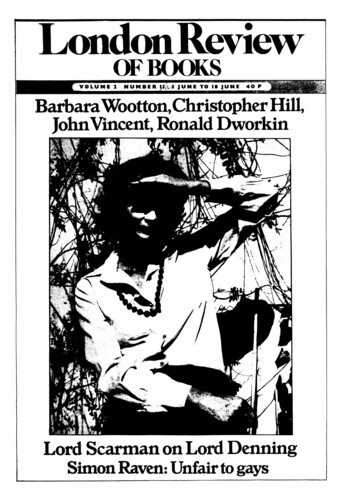Although Iris Murdoch and other females are on the roll, this book is almost entirely about the ways in which male homosexual novelists and their heroes evade or challenge established values and customs. In novels by most heterosexuals, and by many homosexuals as well, there is a strong tendency to portray ‘queer’ men as evil seducers or else as capering clowns. ‘The homosexual hero’, on the other hand, since he is presented by authors sympathetic to homosexuality, makes serious proclamation (and boy, oh boy, does he proclaim) of his right to lead his own life in his own way, regardless of parodists and in defiance of persecutors, to reinterpret social and moral conventions in his own terms and in the interest of his own special condition, and to seek out or create his own brave new world beyond the boundaries of the dreary dump in which (it is implied) mere heterosexuals are content to fret and rot from crib to coffin.
Stephen Adams does not propose a general or ‘encompassing’ thesis. Having insisted that methods and messages are diverse and individual, he settles down to record them, beginning with Gore Vidal and ending with Jean Genet. His manner is to give detailed and surprisingly readable accounts of the plots of an author’s salient novels, sprinkling these accounts with sharp comments as to the thought or motive that may have lain behind such and such a device of plotting or characterisation. He then essays some broader judgments about the novelist’s attitudes towards humanity as a whole and homosexual humanity in particular. He points out, for example, that Capote’s homosexuals tend to take refuge in a childish and freakish fairyland (sorry) which bristles with Gothic apparatus; that E.M. Forster’s prescribed way of escape was into an imaginary Forest of Arden peopled, not with etiolated time-wasters like Jaques or Rosalind, but with butch and randy gamekeepers who are thirsting to whip Young Master’s knickers down; or that Simon Raven’s heroes (to compare small things with great) hanker after both conventional success and the goodies of Gay Cockayne, which of course is very greedy of them and quite rightly leads to their resounding pratfalls.
Now, none of this is dull (though there are some ugly clots of jargon here and there), and on the whole Mr Adams’s survey of homosexual novelists, their protagonists, their attitudes, their fantasies, their aims and their endings, is not only enjoyable but serviceable. However, I have one enormous bone to pick.
From every page of this book, from the mouths of all the novelists and of all their characters, issues an unquenchable whine of unction and self-pity, which is varied only by the grinding hum (as of bluebottles busy with a summer turd) of rancorous complaint. The grievances of homosexuals, like those of unmarried mothers or the Leyland workers, are interminable and unassuageable. ‘The hearties wrecked my pretty rooms at Oxford.’ ‘We would have been beautifully compatible but Class came between us.’ ‘He got cold feet and went back to his dismal wife.’ ‘My trouble is that I come too quickly.’ ‘My trouble is that I can’t come at all.’ Etc, etc, ad nauseam. And always and above all, whatever the precise nature of the immediate gripe, there is the general amplification, sometimes overt, sometimes implied, in any case unmistakable, that everything in every way is UNFAIR TO GAYS: they are falsely accused, wickedly deprived, savagely discriminated against.
Now then. First, this is no longer true. Secondly, while it may have been true when some of the books under discussion were written, many of them came out after Wolfenden, and even before Wolfenden, let us remember, there was a partial enlightenment: granted, this did not operate in favour of braggarts, proselytisers or exhibitionists, who deliberately provoked trouble and then squealed when they got it: but it did enable most sensible homosexuals to get on with their private lives without interference. Thirdly, even if every complaint ever made by homosexuals were entirely justified, this orgy of snivelling and drivelling would still be contemptible where not merely risible.
I’m not saying that Mr Adams approves of all this gnashing of teeth, but he does make sure that it is very loudly heard, drowning the voices of the more moderate, who, I hope and suspect, would speak very much as follows: I myself am indifferent queer (bi), but I have had nothing very much to worry about in that line since a nasty scandal at school, thirty-five years ago. If, of course, your search for self-fulfilment involves getting yourself up like Messalina or offering yourself round Sauna Baths like something out of Genet, then you’d better watch out for trouble. But if you keep your head and voice down (which is a good rule in any context) you need fear neither hostility nor ridicule. Ah, you say, but people disapprove. People disapprove of lots of jolly things – of football pools, rich cookery, rude films, Princess Margaret Rose, foreign travel and the public schools – yet all these institutions continue unabashed. So can you. I count among my homosexual acquaintances a whole squadron of dons and schoolmasters, at least one general, several well-regarded MPs and substantial civil servants, and a banker – to say nothing of writers, painters, actors and fashionable male whores. The only thing any of these ever complains about is the sanctimonious imbecility of the Gay Liberation movement, as it shrilly and effortlessly goes about destroying its own cause.
Send Letters To:
The Editor
London Review of Books,
28 Little Russell Street
London, WC1A 2HN
letters@lrb.co.uk
Please include name, address, and a telephone number.

